Volkswagen and FDI | Essay
VerifiedAdded on 2022/08/19
|12
|2914
|27
AI Summary
Contribute Materials
Your contribution can guide someone’s learning journey. Share your
documents today.
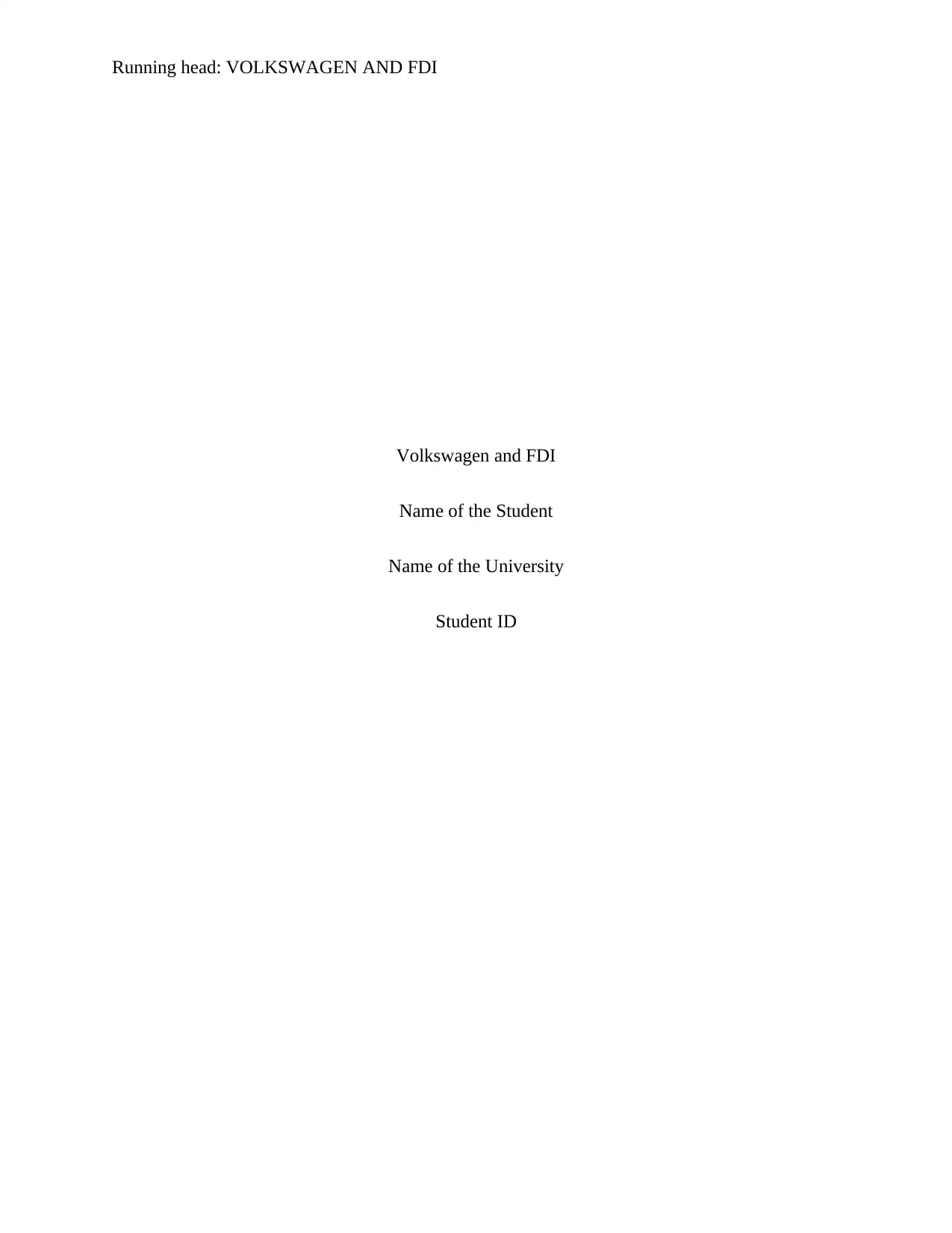
Running head: VOLKSWAGEN AND FDI
Volkswagen and FDI
Name of the Student
Name of the University
Student ID
Volkswagen and FDI
Name of the Student
Name of the University
Student ID
Secure Best Marks with AI Grader
Need help grading? Try our AI Grader for instant feedback on your assignments.
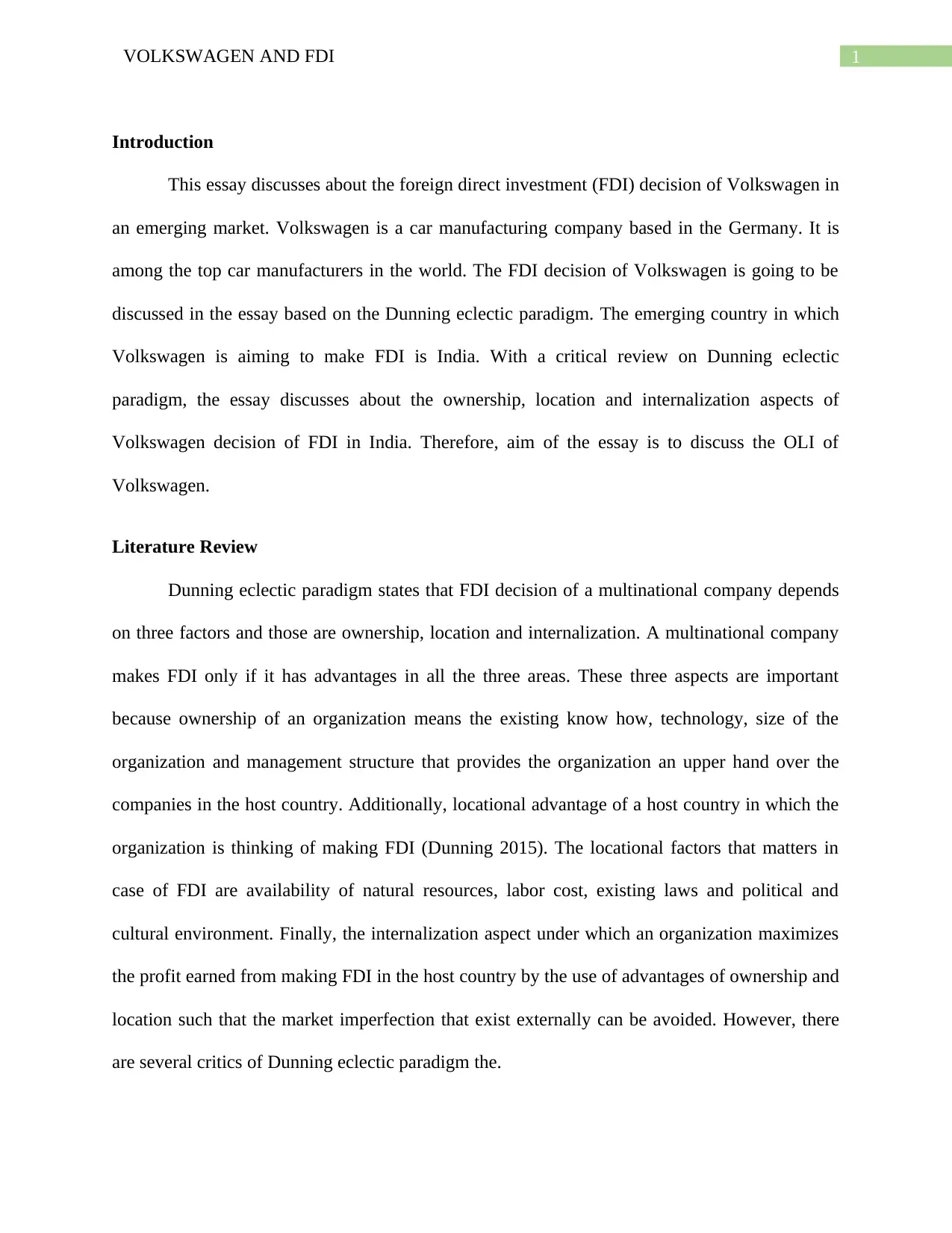
1VOLKSWAGEN AND FDI
Introduction
This essay discusses about the foreign direct investment (FDI) decision of Volkswagen in
an emerging market. Volkswagen is a car manufacturing company based in the Germany. It is
among the top car manufacturers in the world. The FDI decision of Volkswagen is going to be
discussed in the essay based on the Dunning eclectic paradigm. The emerging country in which
Volkswagen is aiming to make FDI is India. With a critical review on Dunning eclectic
paradigm, the essay discusses about the ownership, location and internalization aspects of
Volkswagen decision of FDI in India. Therefore, aim of the essay is to discuss the OLI of
Volkswagen.
Literature Review
Dunning eclectic paradigm states that FDI decision of a multinational company depends
on three factors and those are ownership, location and internalization. A multinational company
makes FDI only if it has advantages in all the three areas. These three aspects are important
because ownership of an organization means the existing know how, technology, size of the
organization and management structure that provides the organization an upper hand over the
companies in the host country. Additionally, locational advantage of a host country in which the
organization is thinking of making FDI (Dunning 2015). The locational factors that matters in
case of FDI are availability of natural resources, labor cost, existing laws and political and
cultural environment. Finally, the internalization aspect under which an organization maximizes
the profit earned from making FDI in the host country by the use of advantages of ownership and
location such that the market imperfection that exist externally can be avoided. However, there
are several critics of Dunning eclectic paradigm the.
Introduction
This essay discusses about the foreign direct investment (FDI) decision of Volkswagen in
an emerging market. Volkswagen is a car manufacturing company based in the Germany. It is
among the top car manufacturers in the world. The FDI decision of Volkswagen is going to be
discussed in the essay based on the Dunning eclectic paradigm. The emerging country in which
Volkswagen is aiming to make FDI is India. With a critical review on Dunning eclectic
paradigm, the essay discusses about the ownership, location and internalization aspects of
Volkswagen decision of FDI in India. Therefore, aim of the essay is to discuss the OLI of
Volkswagen.
Literature Review
Dunning eclectic paradigm states that FDI decision of a multinational company depends
on three factors and those are ownership, location and internalization. A multinational company
makes FDI only if it has advantages in all the three areas. These three aspects are important
because ownership of an organization means the existing know how, technology, size of the
organization and management structure that provides the organization an upper hand over the
companies in the host country. Additionally, locational advantage of a host country in which the
organization is thinking of making FDI (Dunning 2015). The locational factors that matters in
case of FDI are availability of natural resources, labor cost, existing laws and political and
cultural environment. Finally, the internalization aspect under which an organization maximizes
the profit earned from making FDI in the host country by the use of advantages of ownership and
location such that the market imperfection that exist externally can be avoided. However, there
are several critics of Dunning eclectic paradigm the.
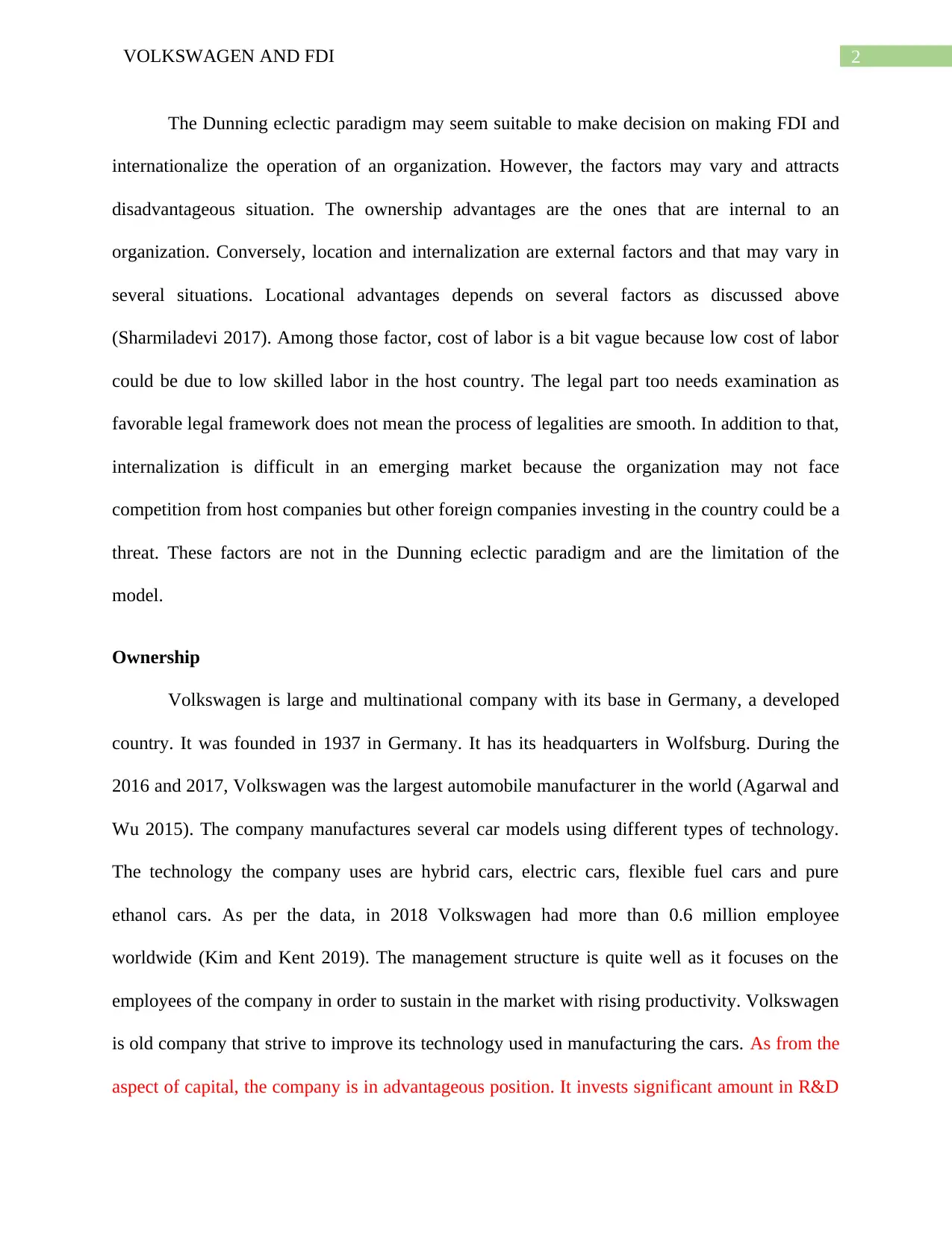
2VOLKSWAGEN AND FDI
The Dunning eclectic paradigm may seem suitable to make decision on making FDI and
internationalize the operation of an organization. However, the factors may vary and attracts
disadvantageous situation. The ownership advantages are the ones that are internal to an
organization. Conversely, location and internalization are external factors and that may vary in
several situations. Locational advantages depends on several factors as discussed above
(Sharmiladevi 2017). Among those factor, cost of labor is a bit vague because low cost of labor
could be due to low skilled labor in the host country. The legal part too needs examination as
favorable legal framework does not mean the process of legalities are smooth. In addition to that,
internalization is difficult in an emerging market because the organization may not face
competition from host companies but other foreign companies investing in the country could be a
threat. These factors are not in the Dunning eclectic paradigm and are the limitation of the
model.
Ownership
Volkswagen is large and multinational company with its base in Germany, a developed
country. It was founded in 1937 in Germany. It has its headquarters in Wolfsburg. During the
2016 and 2017, Volkswagen was the largest automobile manufacturer in the world (Agarwal and
Wu 2015). The company manufactures several car models using different types of technology.
The technology the company uses are hybrid cars, electric cars, flexible fuel cars and pure
ethanol cars. As per the data, in 2018 Volkswagen had more than 0.6 million employee
worldwide (Kim and Kent 2019). The management structure is quite well as it focuses on the
employees of the company in order to sustain in the market with rising productivity. Volkswagen
is old company that strive to improve its technology used in manufacturing the cars. As from the
aspect of capital, the company is in advantageous position. It invests significant amount in R&D
The Dunning eclectic paradigm may seem suitable to make decision on making FDI and
internationalize the operation of an organization. However, the factors may vary and attracts
disadvantageous situation. The ownership advantages are the ones that are internal to an
organization. Conversely, location and internalization are external factors and that may vary in
several situations. Locational advantages depends on several factors as discussed above
(Sharmiladevi 2017). Among those factor, cost of labor is a bit vague because low cost of labor
could be due to low skilled labor in the host country. The legal part too needs examination as
favorable legal framework does not mean the process of legalities are smooth. In addition to that,
internalization is difficult in an emerging market because the organization may not face
competition from host companies but other foreign companies investing in the country could be a
threat. These factors are not in the Dunning eclectic paradigm and are the limitation of the
model.
Ownership
Volkswagen is large and multinational company with its base in Germany, a developed
country. It was founded in 1937 in Germany. It has its headquarters in Wolfsburg. During the
2016 and 2017, Volkswagen was the largest automobile manufacturer in the world (Agarwal and
Wu 2015). The company manufactures several car models using different types of technology.
The technology the company uses are hybrid cars, electric cars, flexible fuel cars and pure
ethanol cars. As per the data, in 2018 Volkswagen had more than 0.6 million employee
worldwide (Kim and Kent 2019). The management structure is quite well as it focuses on the
employees of the company in order to sustain in the market with rising productivity. Volkswagen
is old company that strive to improve its technology used in manufacturing the cars. As from the
aspect of capital, the company is in advantageous position. It invests significant amount in R&D
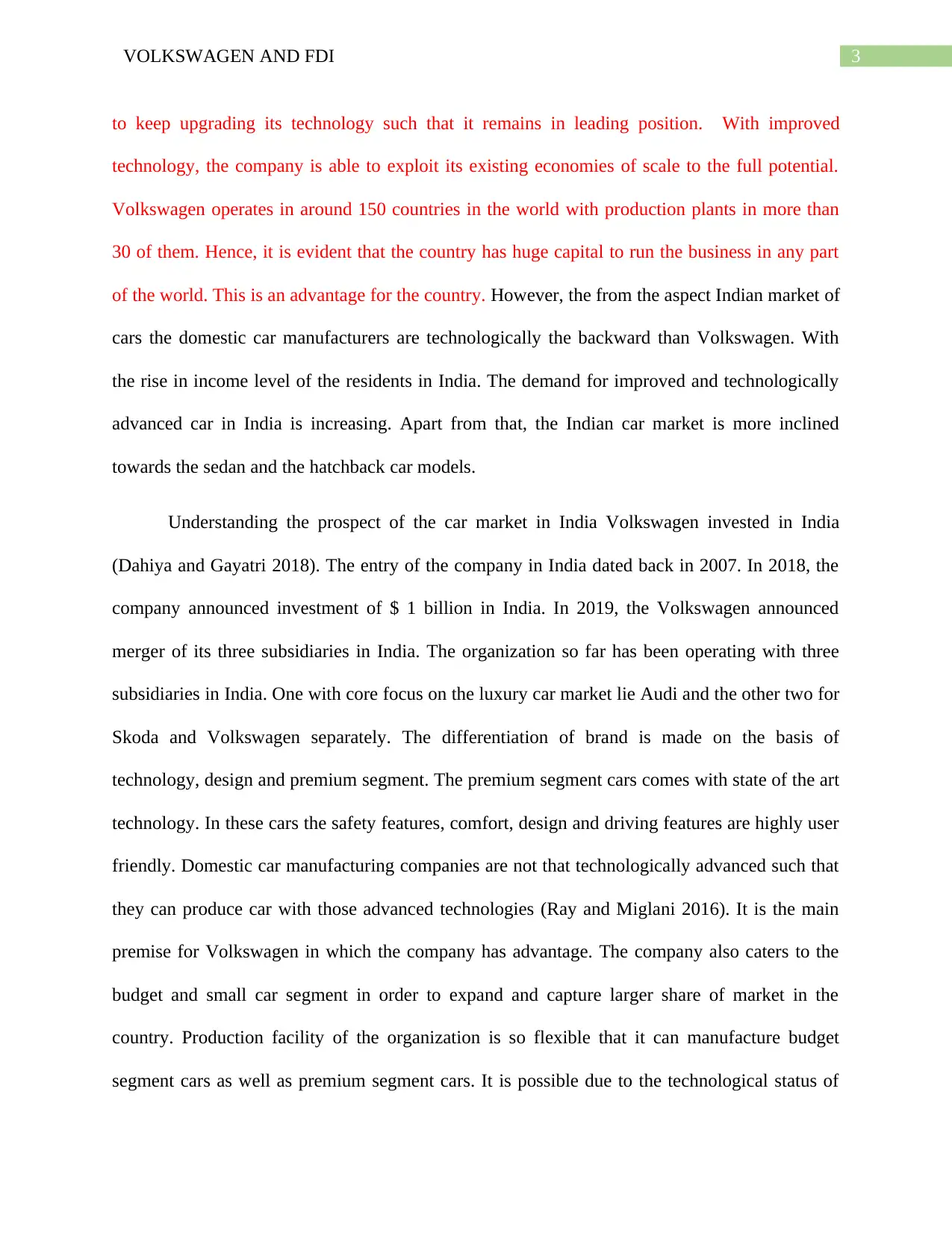
3VOLKSWAGEN AND FDI
to keep upgrading its technology such that it remains in leading position. With improved
technology, the company is able to exploit its existing economies of scale to the full potential.
Volkswagen operates in around 150 countries in the world with production plants in more than
30 of them. Hence, it is evident that the country has huge capital to run the business in any part
of the world. This is an advantage for the country. However, the from the aspect Indian market of
cars the domestic car manufacturers are technologically the backward than Volkswagen. With
the rise in income level of the residents in India. The demand for improved and technologically
advanced car in India is increasing. Apart from that, the Indian car market is more inclined
towards the sedan and the hatchback car models.
Understanding the prospect of the car market in India Volkswagen invested in India
(Dahiya and Gayatri 2018). The entry of the company in India dated back in 2007. In 2018, the
company announced investment of $ 1 billion in India. In 2019, the Volkswagen announced
merger of its three subsidiaries in India. The organization so far has been operating with three
subsidiaries in India. One with core focus on the luxury car market lie Audi and the other two for
Skoda and Volkswagen separately. The differentiation of brand is made on the basis of
technology, design and premium segment. The premium segment cars comes with state of the art
technology. In these cars the safety features, comfort, design and driving features are highly user
friendly. Domestic car manufacturing companies are not that technologically advanced such that
they can produce car with those advanced technologies (Ray and Miglani 2016). It is the main
premise for Volkswagen in which the company has advantage. The company also caters to the
budget and small car segment in order to expand and capture larger share of market in the
country. Production facility of the organization is so flexible that it can manufacture budget
segment cars as well as premium segment cars. It is possible due to the technological status of
to keep upgrading its technology such that it remains in leading position. With improved
technology, the company is able to exploit its existing economies of scale to the full potential.
Volkswagen operates in around 150 countries in the world with production plants in more than
30 of them. Hence, it is evident that the country has huge capital to run the business in any part
of the world. This is an advantage for the country. However, the from the aspect Indian market of
cars the domestic car manufacturers are technologically the backward than Volkswagen. With
the rise in income level of the residents in India. The demand for improved and technologically
advanced car in India is increasing. Apart from that, the Indian car market is more inclined
towards the sedan and the hatchback car models.
Understanding the prospect of the car market in India Volkswagen invested in India
(Dahiya and Gayatri 2018). The entry of the company in India dated back in 2007. In 2018, the
company announced investment of $ 1 billion in India. In 2019, the Volkswagen announced
merger of its three subsidiaries in India. The organization so far has been operating with three
subsidiaries in India. One with core focus on the luxury car market lie Audi and the other two for
Skoda and Volkswagen separately. The differentiation of brand is made on the basis of
technology, design and premium segment. The premium segment cars comes with state of the art
technology. In these cars the safety features, comfort, design and driving features are highly user
friendly. Domestic car manufacturing companies are not that technologically advanced such that
they can produce car with those advanced technologies (Ray and Miglani 2016). It is the main
premise for Volkswagen in which the company has advantage. The company also caters to the
budget and small car segment in order to expand and capture larger share of market in the
country. Production facility of the organization is so flexible that it can manufacture budget
segment cars as well as premium segment cars. It is possible due to the technological status of
Secure Best Marks with AI Grader
Need help grading? Try our AI Grader for instant feedback on your assignments.
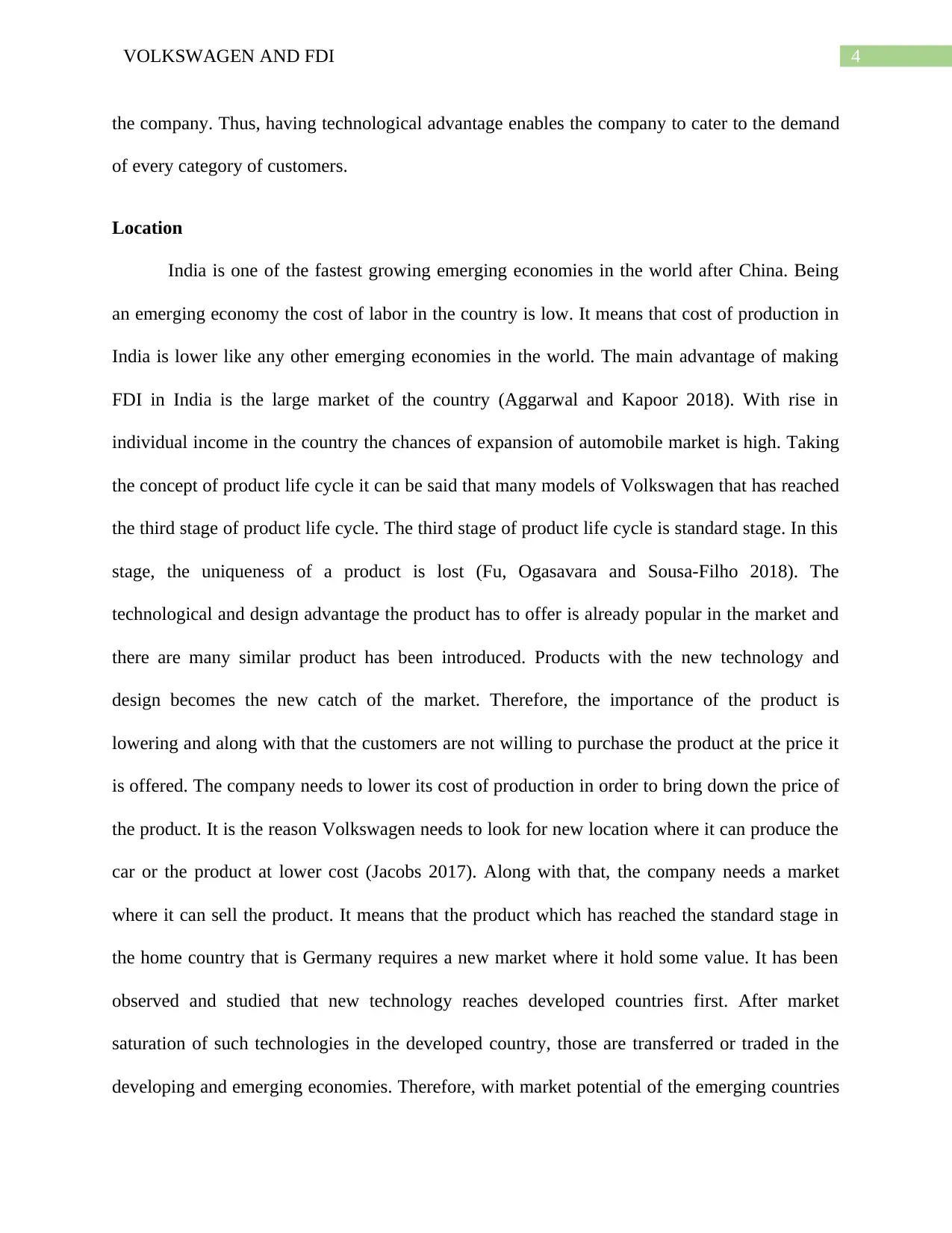
4VOLKSWAGEN AND FDI
the company. Thus, having technological advantage enables the company to cater to the demand
of every category of customers.
Location
India is one of the fastest growing emerging economies in the world after China. Being
an emerging economy the cost of labor in the country is low. It means that cost of production in
India is lower like any other emerging economies in the world. The main advantage of making
FDI in India is the large market of the country (Aggarwal and Kapoor 2018). With rise in
individual income in the country the chances of expansion of automobile market is high. Taking
the concept of product life cycle it can be said that many models of Volkswagen that has reached
the third stage of product life cycle. The third stage of product life cycle is standard stage. In this
stage, the uniqueness of a product is lost (Fu, Ogasavara and Sousa-Filho 2018). The
technological and design advantage the product has to offer is already popular in the market and
there are many similar product has been introduced. Products with the new technology and
design becomes the new catch of the market. Therefore, the importance of the product is
lowering and along with that the customers are not willing to purchase the product at the price it
is offered. The company needs to lower its cost of production in order to bring down the price of
the product. It is the reason Volkswagen needs to look for new location where it can produce the
car or the product at lower cost (Jacobs 2017). Along with that, the company needs a market
where it can sell the product. It means that the product which has reached the standard stage in
the home country that is Germany requires a new market where it hold some value. It has been
observed and studied that new technology reaches developed countries first. After market
saturation of such technologies in the developed country, those are transferred or traded in the
developing and emerging economies. Therefore, with market potential of the emerging countries
the company. Thus, having technological advantage enables the company to cater to the demand
of every category of customers.
Location
India is one of the fastest growing emerging economies in the world after China. Being
an emerging economy the cost of labor in the country is low. It means that cost of production in
India is lower like any other emerging economies in the world. The main advantage of making
FDI in India is the large market of the country (Aggarwal and Kapoor 2018). With rise in
individual income in the country the chances of expansion of automobile market is high. Taking
the concept of product life cycle it can be said that many models of Volkswagen that has reached
the third stage of product life cycle. The third stage of product life cycle is standard stage. In this
stage, the uniqueness of a product is lost (Fu, Ogasavara and Sousa-Filho 2018). The
technological and design advantage the product has to offer is already popular in the market and
there are many similar product has been introduced. Products with the new technology and
design becomes the new catch of the market. Therefore, the importance of the product is
lowering and along with that the customers are not willing to purchase the product at the price it
is offered. The company needs to lower its cost of production in order to bring down the price of
the product. It is the reason Volkswagen needs to look for new location where it can produce the
car or the product at lower cost (Jacobs 2017). Along with that, the company needs a market
where it can sell the product. It means that the product which has reached the standard stage in
the home country that is Germany requires a new market where it hold some value. It has been
observed and studied that new technology reaches developed countries first. After market
saturation of such technologies in the developed country, those are transferred or traded in the
developing and emerging economies. Therefore, with market potential of the emerging countries
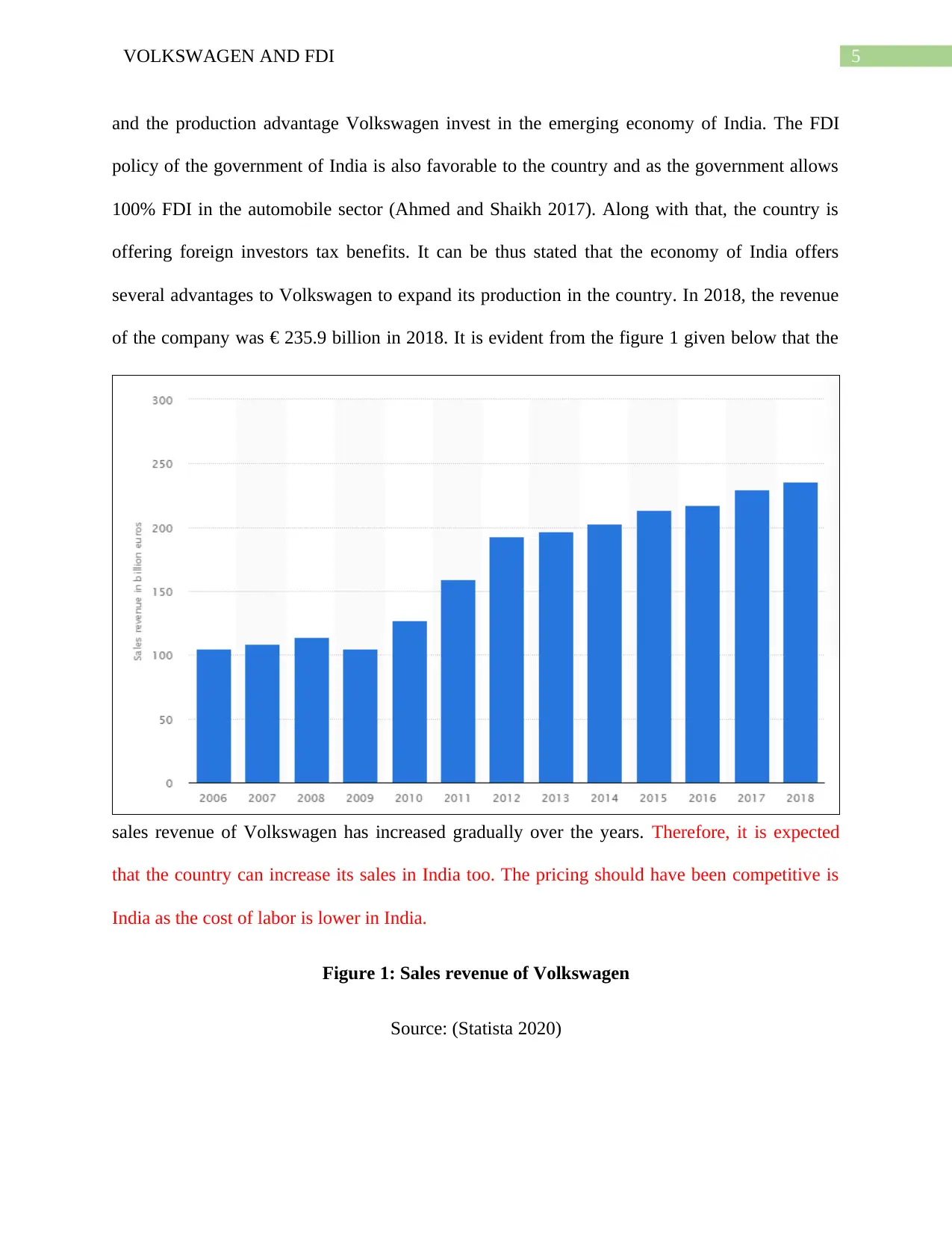
5VOLKSWAGEN AND FDI
and the production advantage Volkswagen invest in the emerging economy of India. The FDI
policy of the government of India is also favorable to the country and as the government allows
100% FDI in the automobile sector (Ahmed and Shaikh 2017). Along with that, the country is
offering foreign investors tax benefits. It can be thus stated that the economy of India offers
several advantages to Volkswagen to expand its production in the country. In 2018, the revenue
of the company was € 235.9 billion in 2018. It is evident from the figure 1 given below that the
sales revenue of Volkswagen has increased gradually over the years. Therefore, it is expected
that the country can increase its sales in India too. The pricing should have been competitive is
India as the cost of labor is lower in India.
Figure 1: Sales revenue of Volkswagen
Source: (Statista 2020)
and the production advantage Volkswagen invest in the emerging economy of India. The FDI
policy of the government of India is also favorable to the country and as the government allows
100% FDI in the automobile sector (Ahmed and Shaikh 2017). Along with that, the country is
offering foreign investors tax benefits. It can be thus stated that the economy of India offers
several advantages to Volkswagen to expand its production in the country. In 2018, the revenue
of the company was € 235.9 billion in 2018. It is evident from the figure 1 given below that the
sales revenue of Volkswagen has increased gradually over the years. Therefore, it is expected
that the country can increase its sales in India too. The pricing should have been competitive is
India as the cost of labor is lower in India.
Figure 1: Sales revenue of Volkswagen
Source: (Statista 2020)
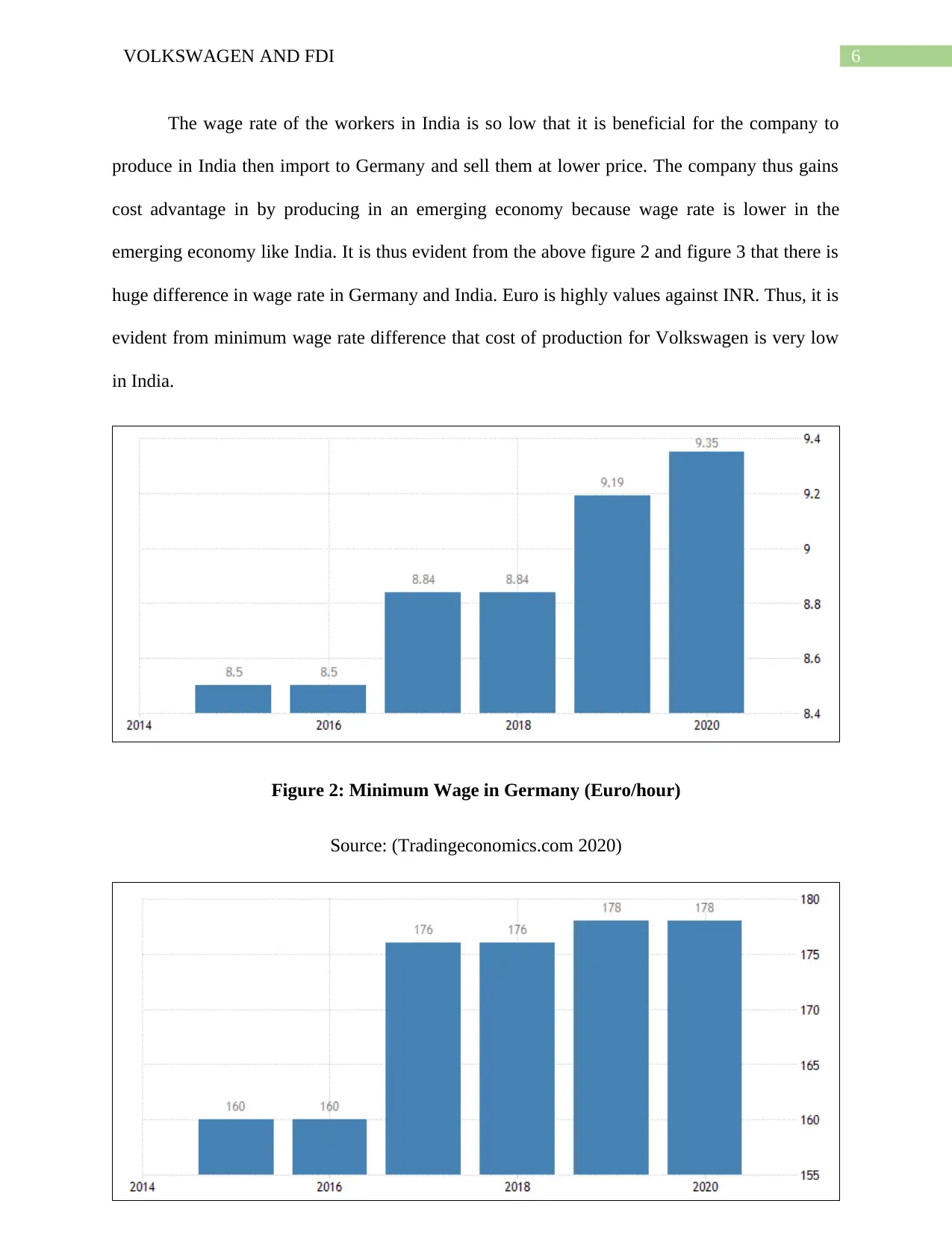
6VOLKSWAGEN AND FDI
The wage rate of the workers in India is so low that it is beneficial for the company to
produce in India then import to Germany and sell them at lower price. The company thus gains
cost advantage in by producing in an emerging economy because wage rate is lower in the
emerging economy like India. It is thus evident from the above figure 2 and figure 3 that there is
huge difference in wage rate in Germany and India. Euro is highly values against INR. Thus, it is
evident from minimum wage rate difference that cost of production for Volkswagen is very low
in India.
Figure 2: Minimum Wage in Germany (Euro/hour)
Source: (Tradingeconomics.com 2020)
The wage rate of the workers in India is so low that it is beneficial for the company to
produce in India then import to Germany and sell them at lower price. The company thus gains
cost advantage in by producing in an emerging economy because wage rate is lower in the
emerging economy like India. It is thus evident from the above figure 2 and figure 3 that there is
huge difference in wage rate in Germany and India. Euro is highly values against INR. Thus, it is
evident from minimum wage rate difference that cost of production for Volkswagen is very low
in India.
Figure 2: Minimum Wage in Germany (Euro/hour)
Source: (Tradingeconomics.com 2020)
Paraphrase This Document
Need a fresh take? Get an instant paraphrase of this document with our AI Paraphraser
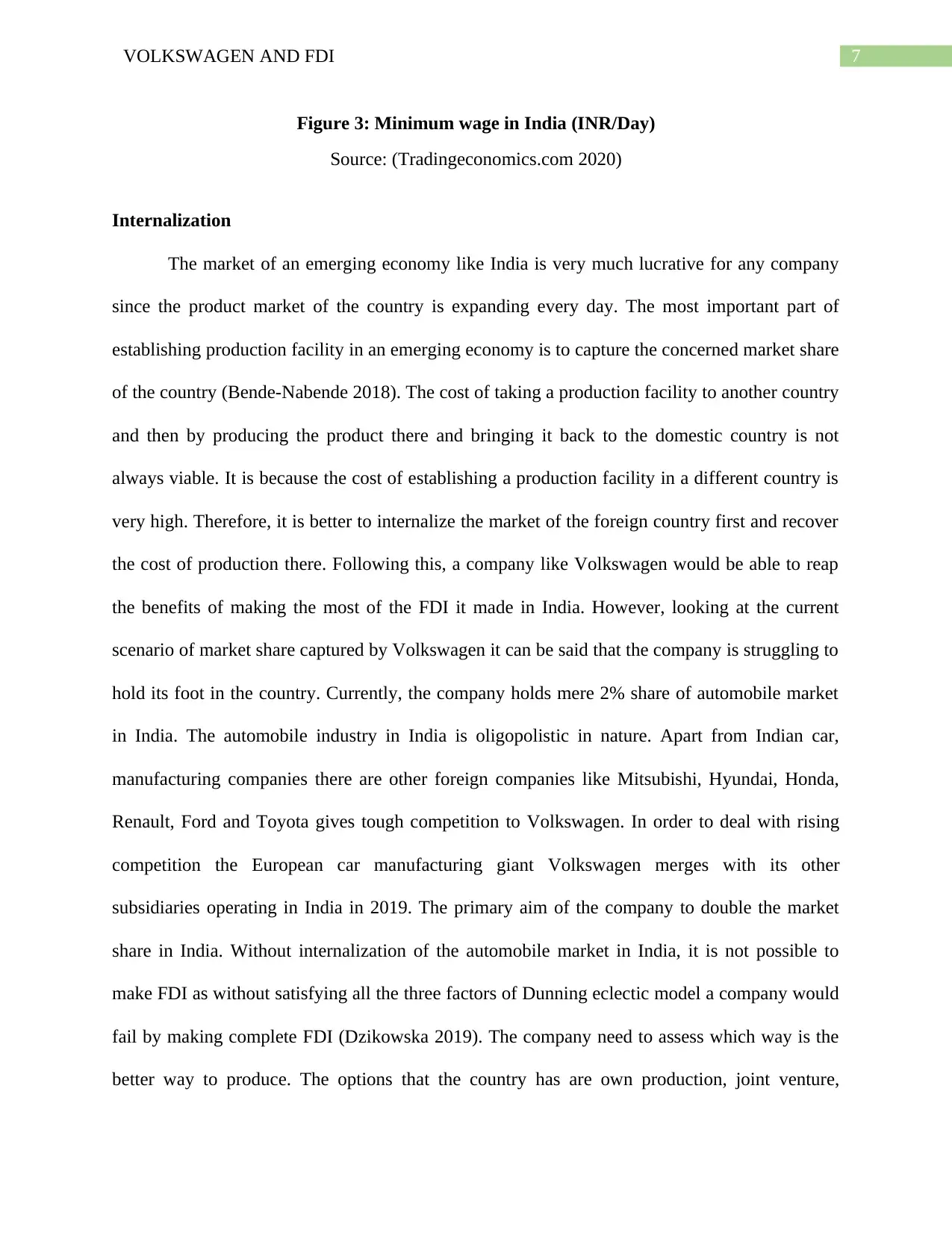
7VOLKSWAGEN AND FDI
Figure 3: Minimum wage in India (INR/Day)
Source: (Tradingeconomics.com 2020)
Internalization
The market of an emerging economy like India is very much lucrative for any company
since the product market of the country is expanding every day. The most important part of
establishing production facility in an emerging economy is to capture the concerned market share
of the country (Bende-Nabende 2018). The cost of taking a production facility to another country
and then by producing the product there and bringing it back to the domestic country is not
always viable. It is because the cost of establishing a production facility in a different country is
very high. Therefore, it is better to internalize the market of the foreign country first and recover
the cost of production there. Following this, a company like Volkswagen would be able to reap
the benefits of making the most of the FDI it made in India. However, looking at the current
scenario of market share captured by Volkswagen it can be said that the company is struggling to
hold its foot in the country. Currently, the company holds mere 2% share of automobile market
in India. The automobile industry in India is oligopolistic in nature. Apart from Indian car,
manufacturing companies there are other foreign companies like Mitsubishi, Hyundai, Honda,
Renault, Ford and Toyota gives tough competition to Volkswagen. In order to deal with rising
competition the European car manufacturing giant Volkswagen merges with its other
subsidiaries operating in India in 2019. The primary aim of the company to double the market
share in India. Without internalization of the automobile market in India, it is not possible to
make FDI as without satisfying all the three factors of Dunning eclectic model a company would
fail by making complete FDI (Dzikowska 2019). The company need to assess which way is the
better way to produce. The options that the country has are own production, joint venture,
Figure 3: Minimum wage in India (INR/Day)
Source: (Tradingeconomics.com 2020)
Internalization
The market of an emerging economy like India is very much lucrative for any company
since the product market of the country is expanding every day. The most important part of
establishing production facility in an emerging economy is to capture the concerned market share
of the country (Bende-Nabende 2018). The cost of taking a production facility to another country
and then by producing the product there and bringing it back to the domestic country is not
always viable. It is because the cost of establishing a production facility in a different country is
very high. Therefore, it is better to internalize the market of the foreign country first and recover
the cost of production there. Following this, a company like Volkswagen would be able to reap
the benefits of making the most of the FDI it made in India. However, looking at the current
scenario of market share captured by Volkswagen it can be said that the company is struggling to
hold its foot in the country. Currently, the company holds mere 2% share of automobile market
in India. The automobile industry in India is oligopolistic in nature. Apart from Indian car,
manufacturing companies there are other foreign companies like Mitsubishi, Hyundai, Honda,
Renault, Ford and Toyota gives tough competition to Volkswagen. In order to deal with rising
competition the European car manufacturing giant Volkswagen merges with its other
subsidiaries operating in India in 2019. The primary aim of the company to double the market
share in India. Without internalization of the automobile market in India, it is not possible to
make FDI as without satisfying all the three factors of Dunning eclectic model a company would
fail by making complete FDI (Dzikowska 2019). The company need to assess which way is the
better way to produce. The options that the country has are own production, joint venture,
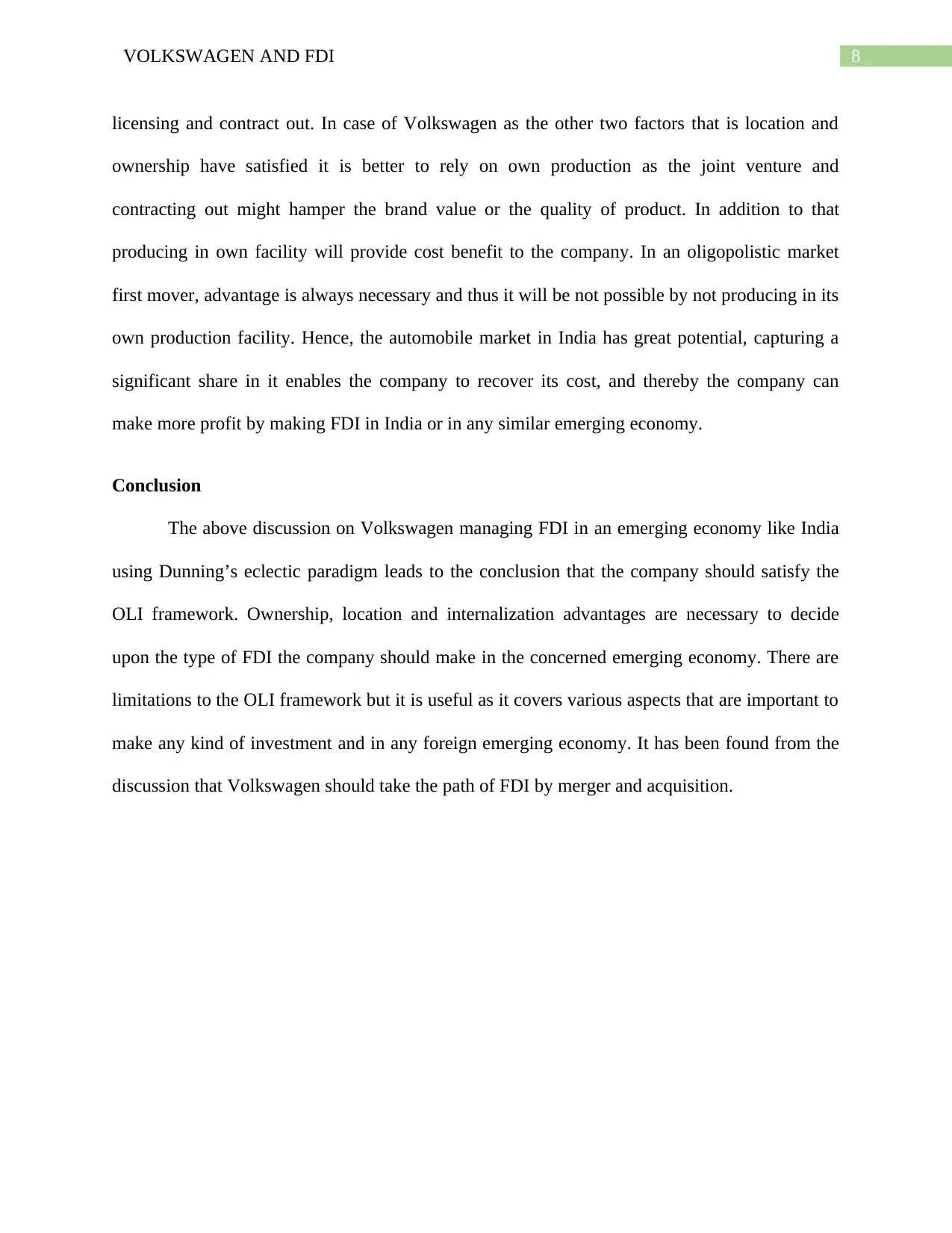
8VOLKSWAGEN AND FDI
licensing and contract out. In case of Volkswagen as the other two factors that is location and
ownership have satisfied it is better to rely on own production as the joint venture and
contracting out might hamper the brand value or the quality of product. In addition to that
producing in own facility will provide cost benefit to the company. In an oligopolistic market
first mover, advantage is always necessary and thus it will be not possible by not producing in its
own production facility. Hence, the automobile market in India has great potential, capturing a
significant share in it enables the company to recover its cost, and thereby the company can
make more profit by making FDI in India or in any similar emerging economy.
Conclusion
The above discussion on Volkswagen managing FDI in an emerging economy like India
using Dunning’s eclectic paradigm leads to the conclusion that the company should satisfy the
OLI framework. Ownership, location and internalization advantages are necessary to decide
upon the type of FDI the company should make in the concerned emerging economy. There are
limitations to the OLI framework but it is useful as it covers various aspects that are important to
make any kind of investment and in any foreign emerging economy. It has been found from the
discussion that Volkswagen should take the path of FDI by merger and acquisition.
licensing and contract out. In case of Volkswagen as the other two factors that is location and
ownership have satisfied it is better to rely on own production as the joint venture and
contracting out might hamper the brand value or the quality of product. In addition to that
producing in own facility will provide cost benefit to the company. In an oligopolistic market
first mover, advantage is always necessary and thus it will be not possible by not producing in its
own production facility. Hence, the automobile market in India has great potential, capturing a
significant share in it enables the company to recover its cost, and thereby the company can
make more profit by making FDI in India or in any similar emerging economy.
Conclusion
The above discussion on Volkswagen managing FDI in an emerging economy like India
using Dunning’s eclectic paradigm leads to the conclusion that the company should satisfy the
OLI framework. Ownership, location and internalization advantages are necessary to decide
upon the type of FDI the company should make in the concerned emerging economy. There are
limitations to the OLI framework but it is useful as it covers various aspects that are important to
make any kind of investment and in any foreign emerging economy. It has been found from the
discussion that Volkswagen should take the path of FDI by merger and acquisition.
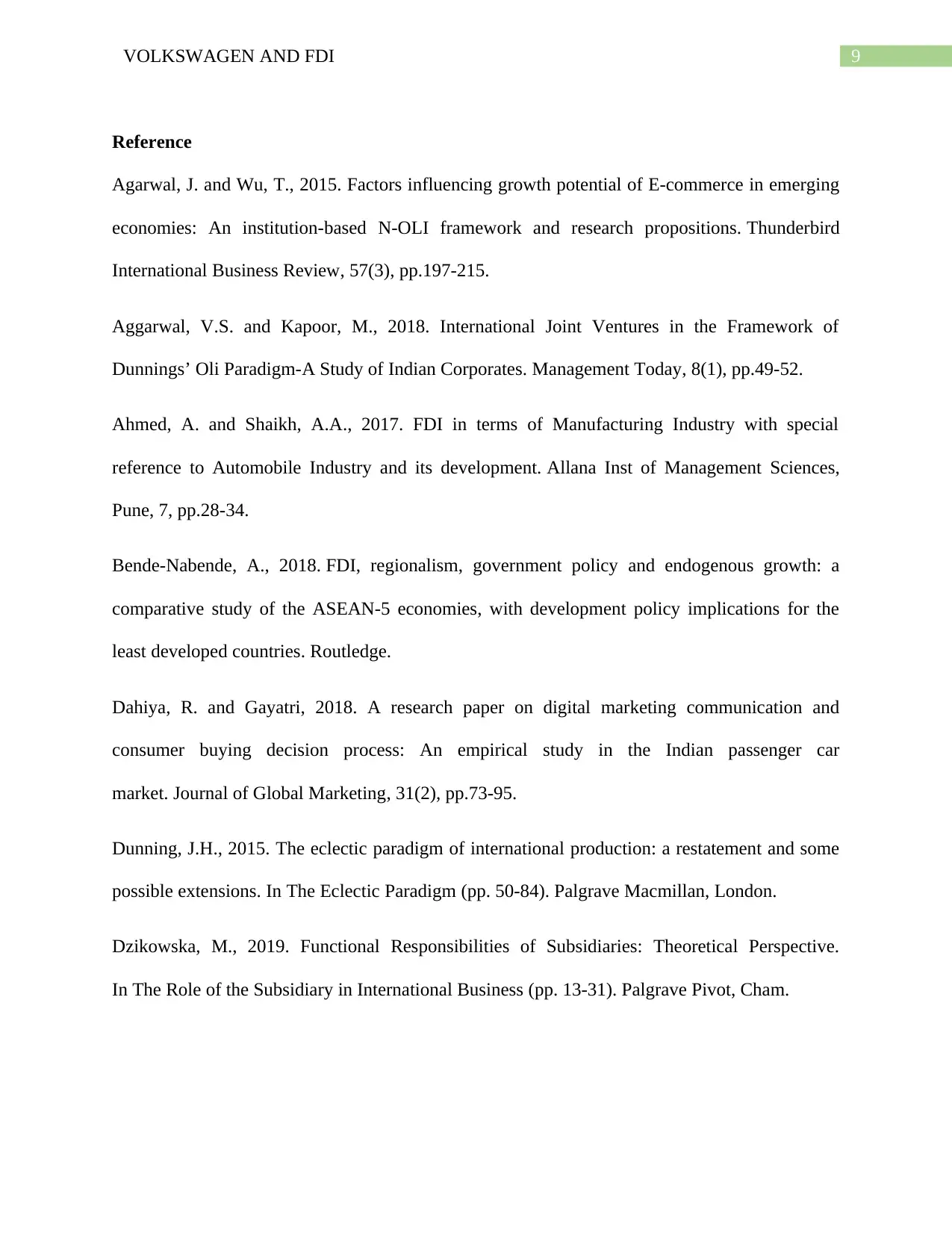
9VOLKSWAGEN AND FDI
Reference
Agarwal, J. and Wu, T., 2015. Factors influencing growth potential of E‐commerce in emerging
economies: An institution‐based N‐OLI framework and research propositions. Thunderbird
International Business Review, 57(3), pp.197-215.
Aggarwal, V.S. and Kapoor, M., 2018. International Joint Ventures in the Framework of
Dunnings’ Oli Paradigm-A Study of Indian Corporates. Management Today, 8(1), pp.49-52.
Ahmed, A. and Shaikh, A.A., 2017. FDI in terms of Manufacturing Industry with special
reference to Automobile Industry and its development. Allana Inst of Management Sciences,
Pune, 7, pp.28-34.
Bende-Nabende, A., 2018. FDI, regionalism, government policy and endogenous growth: a
comparative study of the ASEAN-5 economies, with development policy implications for the
least developed countries. Routledge.
Dahiya, R. and Gayatri, 2018. A research paper on digital marketing communication and
consumer buying decision process: An empirical study in the Indian passenger car
market. Journal of Global Marketing, 31(2), pp.73-95.
Dunning, J.H., 2015. The eclectic paradigm of international production: a restatement and some
possible extensions. In The Eclectic Paradigm (pp. 50-84). Palgrave Macmillan, London.
Dzikowska, M., 2019. Functional Responsibilities of Subsidiaries: Theoretical Perspective.
In The Role of the Subsidiary in International Business (pp. 13-31). Palgrave Pivot, Cham.
Reference
Agarwal, J. and Wu, T., 2015. Factors influencing growth potential of E‐commerce in emerging
economies: An institution‐based N‐OLI framework and research propositions. Thunderbird
International Business Review, 57(3), pp.197-215.
Aggarwal, V.S. and Kapoor, M., 2018. International Joint Ventures in the Framework of
Dunnings’ Oli Paradigm-A Study of Indian Corporates. Management Today, 8(1), pp.49-52.
Ahmed, A. and Shaikh, A.A., 2017. FDI in terms of Manufacturing Industry with special
reference to Automobile Industry and its development. Allana Inst of Management Sciences,
Pune, 7, pp.28-34.
Bende-Nabende, A., 2018. FDI, regionalism, government policy and endogenous growth: a
comparative study of the ASEAN-5 economies, with development policy implications for the
least developed countries. Routledge.
Dahiya, R. and Gayatri, 2018. A research paper on digital marketing communication and
consumer buying decision process: An empirical study in the Indian passenger car
market. Journal of Global Marketing, 31(2), pp.73-95.
Dunning, J.H., 2015. The eclectic paradigm of international production: a restatement and some
possible extensions. In The Eclectic Paradigm (pp. 50-84). Palgrave Macmillan, London.
Dzikowska, M., 2019. Functional Responsibilities of Subsidiaries: Theoretical Perspective.
In The Role of the Subsidiary in International Business (pp. 13-31). Palgrave Pivot, Cham.
Secure Best Marks with AI Grader
Need help grading? Try our AI Grader for instant feedback on your assignments.
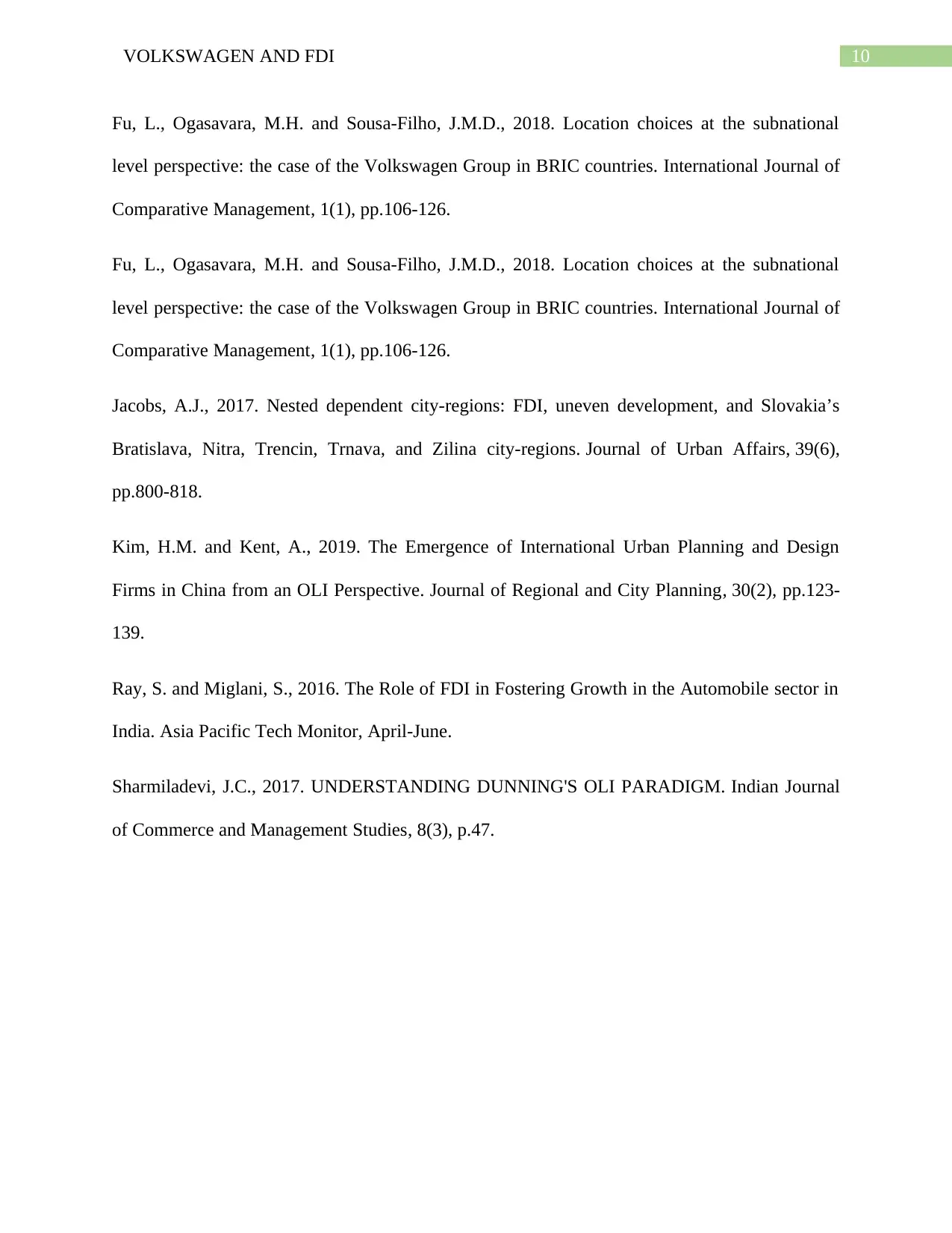
10VOLKSWAGEN AND FDI
Fu, L., Ogasavara, M.H. and Sousa-Filho, J.M.D., 2018. Location choices at the subnational
level perspective: the case of the Volkswagen Group in BRIC countries. International Journal of
Comparative Management, 1(1), pp.106-126.
Fu, L., Ogasavara, M.H. and Sousa-Filho, J.M.D., 2018. Location choices at the subnational
level perspective: the case of the Volkswagen Group in BRIC countries. International Journal of
Comparative Management, 1(1), pp.106-126.
Jacobs, A.J., 2017. Nested dependent city-regions: FDI, uneven development, and Slovakia’s
Bratislava, Nitra, Trencin, Trnava, and Zilina city-regions. Journal of Urban Affairs, 39(6),
pp.800-818.
Kim, H.M. and Kent, A., 2019. The Emergence of International Urban Planning and Design
Firms in China from an OLI Perspective. Journal of Regional and City Planning, 30(2), pp.123-
139.
Ray, S. and Miglani, S., 2016. The Role of FDI in Fostering Growth in the Automobile sector in
India. Asia Pacific Tech Monitor, April-June.
Sharmiladevi, J.C., 2017. UNDERSTANDING DUNNING'S OLI PARADIGM. Indian Journal
of Commerce and Management Studies, 8(3), p.47.
Fu, L., Ogasavara, M.H. and Sousa-Filho, J.M.D., 2018. Location choices at the subnational
level perspective: the case of the Volkswagen Group in BRIC countries. International Journal of
Comparative Management, 1(1), pp.106-126.
Fu, L., Ogasavara, M.H. and Sousa-Filho, J.M.D., 2018. Location choices at the subnational
level perspective: the case of the Volkswagen Group in BRIC countries. International Journal of
Comparative Management, 1(1), pp.106-126.
Jacobs, A.J., 2017. Nested dependent city-regions: FDI, uneven development, and Slovakia’s
Bratislava, Nitra, Trencin, Trnava, and Zilina city-regions. Journal of Urban Affairs, 39(6),
pp.800-818.
Kim, H.M. and Kent, A., 2019. The Emergence of International Urban Planning and Design
Firms in China from an OLI Perspective. Journal of Regional and City Planning, 30(2), pp.123-
139.
Ray, S. and Miglani, S., 2016. The Role of FDI in Fostering Growth in the Automobile sector in
India. Asia Pacific Tech Monitor, April-June.
Sharmiladevi, J.C., 2017. UNDERSTANDING DUNNING'S OLI PARADIGM. Indian Journal
of Commerce and Management Studies, 8(3), p.47.
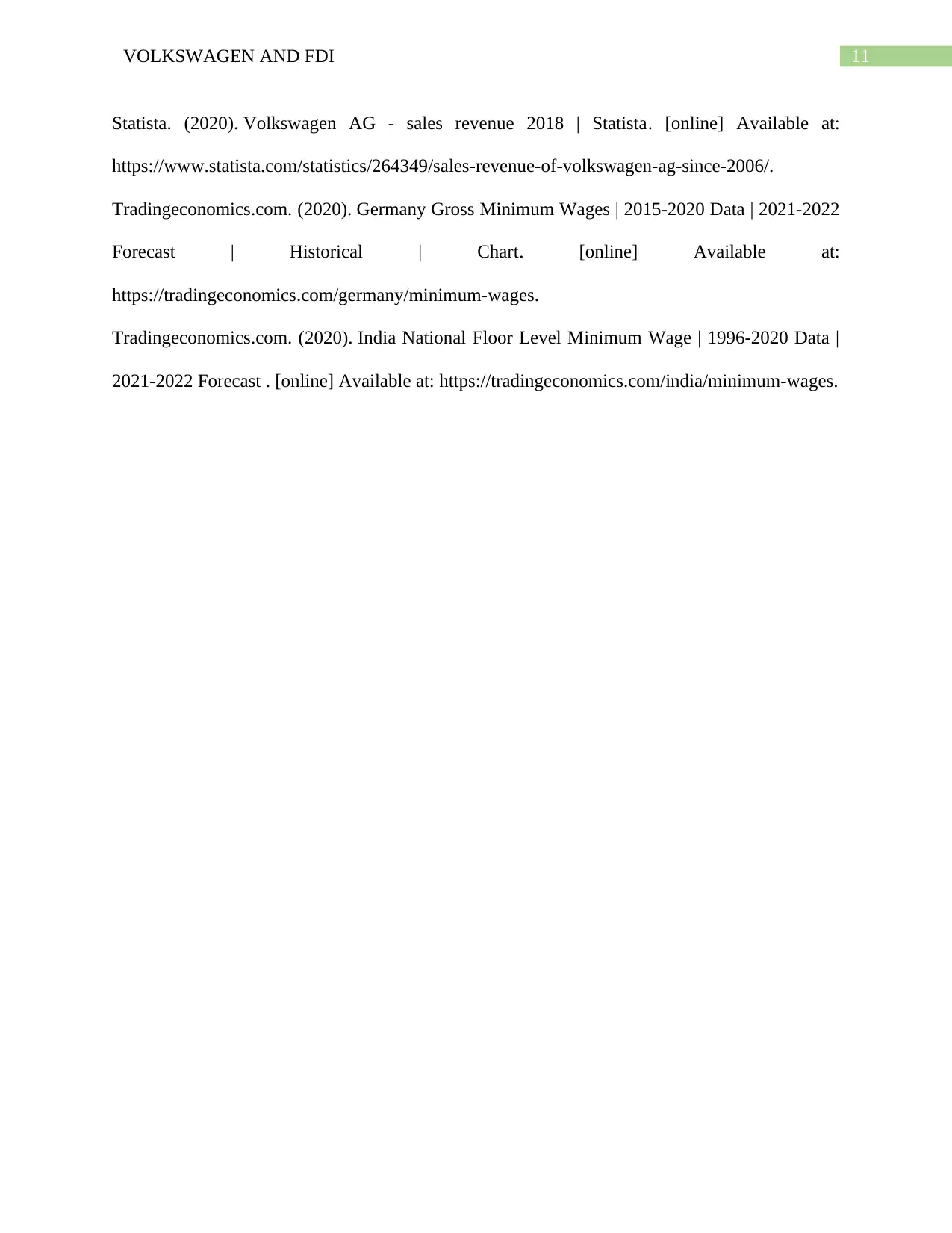
11VOLKSWAGEN AND FDI
Statista. (2020). Volkswagen AG - sales revenue 2018 | Statista. [online] Available at:
https://www.statista.com/statistics/264349/sales-revenue-of-volkswagen-ag-since-2006/.
Tradingeconomics.com. (2020). Germany Gross Minimum Wages | 2015-2020 Data | 2021-2022
Forecast | Historical | Chart. [online] Available at:
https://tradingeconomics.com/germany/minimum-wages.
Tradingeconomics.com. (2020). India National Floor Level Minimum Wage | 1996-2020 Data |
2021-2022 Forecast . [online] Available at: https://tradingeconomics.com/india/minimum-wages.
Statista. (2020). Volkswagen AG - sales revenue 2018 | Statista. [online] Available at:
https://www.statista.com/statistics/264349/sales-revenue-of-volkswagen-ag-since-2006/.
Tradingeconomics.com. (2020). Germany Gross Minimum Wages | 2015-2020 Data | 2021-2022
Forecast | Historical | Chart. [online] Available at:
https://tradingeconomics.com/germany/minimum-wages.
Tradingeconomics.com. (2020). India National Floor Level Minimum Wage | 1996-2020 Data |
2021-2022 Forecast . [online] Available at: https://tradingeconomics.com/india/minimum-wages.
1 out of 12
Related Documents
Your All-in-One AI-Powered Toolkit for Academic Success.
+13062052269
info@desklib.com
Available 24*7 on WhatsApp / Email
![[object Object]](/_next/static/media/star-bottom.7253800d.svg)
Unlock your academic potential
© 2024 | Zucol Services PVT LTD | All rights reserved.





